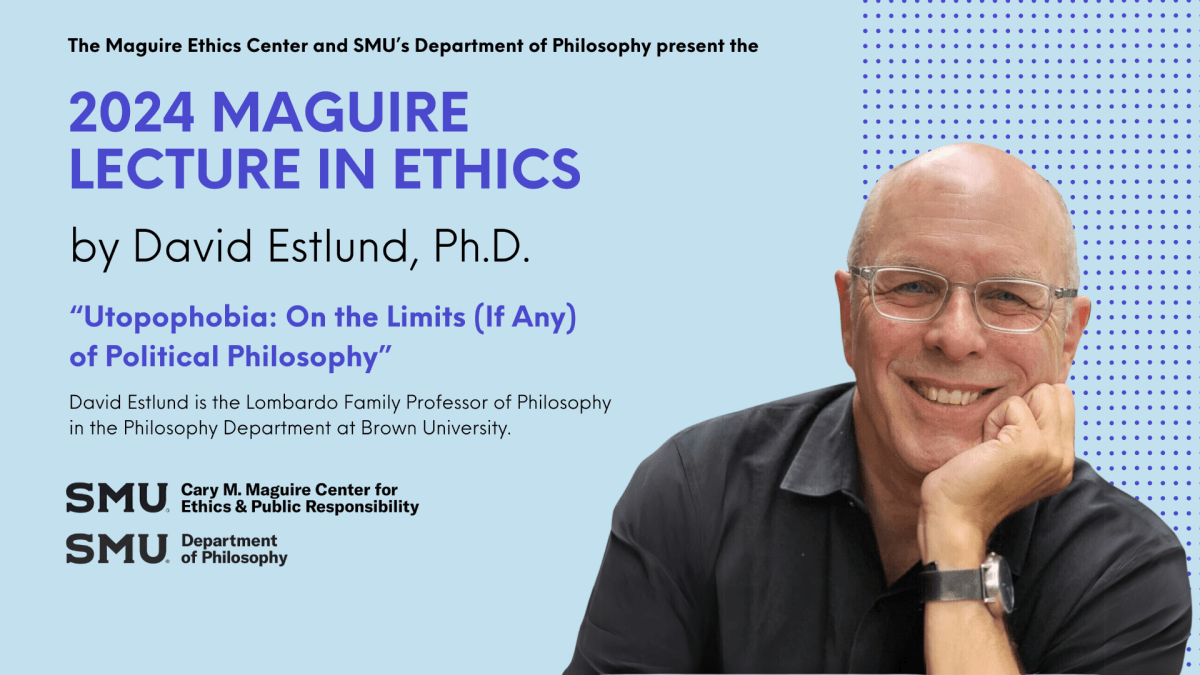Written by Maguire Ethics Center student staffer Caden Arras
SMU’s Cary M. Maguire Center for Ethics and Public Responsibility and SMU’s Philosophy Department jointly hosted Dr. David Estlund, the Lombardo Family Professor of Philosophy in the Philosophy Department at Brown University, for the 2024 Maguire Lecture in Ethics. Dr. Estlund addressed an audience of students, faculty, and staff about his latest book, Utopophobia: On the Limits (If Any) of Political Philosophy.
“It is no defect in a theory or conception of social justice if it is such a high standard that there is little or no chance of its being met, by any society, ever. Such a theory could, nevertheless, be true.”
Dr. Estlund spoke first about the concept of Utopophobia, defining a “Utopaphobe” as someone who fears a theory of justice is so unrealistic it could not happen. He then went on to argue that theories of social justice cannot be considered false or defective based on the likelihood of a society upholding high standards to meet them. To defend this claim, Dr. Estlund began by rejecting the “Human Nature Constraint” of political theory, which posits that “normative political theory is defective and so false if it imposes standards or requirements that ignore human nature.”
“Messy Bill,” a hypothetical character created by Dr. Estlund to deliver this message, personified this constraint. The audience was invited to consider Messy Bill’s refusal to take out the trash on the principle that, no matter how hard he tried, he did not have the heart or willpower to bring the trash out of the house. Dr. Estlund argued that if one is required to do something, one can do it. Therefore, the trash should be taken out despite the character’s objections. Conversely, if one cannot do something because of extenuating conditions or circumstances, they are not required to do it. He also stated that “won’t” does not imply “can’t.” Under these conditions, claiming that Messy Bill would not take out the trash does not mean Messy Bill cannot do it. Dr. Estlund used this justification to explain why human nature cannot supersede the requirements imposed by theories of justice.
Dr. Estlund then argued justice requires a society to build and comply with just institutions regardless of how idealistic their principles are. If we ought to build and comply with just institutions because we are required to do it, then we can build and comply with them regardless of their idealistic nature. This non-concessive approach to justice overrules the counter that building just institutions that will not be complied with seems absurd. Only if a requirement of justice is violated might such institutions not be built.
He established a final provision within just institutions: there is a requirement to build and comply with some theories of justice even if they are not practical today. Dr. Estlund paused his lecture to ask the audience to consider presently unrealistic social objectives, like eliminating world hunger. He compared these challenges to some of today’s standards and norms, like broad access to cures for common diseases and legally enforced racial equality in many countries. The Brown professor argued that, centuries ago, these relatively common standards today would have been almost impossible to implement. Today, we consider them core elements of our lifestyles and societies. If this were the case for past global issues, considering existing proposals to fix modern worldwide challenges may be worthwhile, even if practical challenges limit their viability. Dr. Estlund urged the audience to wonder if we might be wrong about how unrealistic such plans may one day be.
“The argument to ‘that’s not realistic’ is ‘we might be wrong about that.’…We don’t know our own strength.”
Dr. Estlund’s Utopophobia claims any theory of justice could be simultaneously unrealistic and true, contrary to many arguments. His defense of this idealistic approach to justice encourages ambition in creating and implementing political theories. With this lecture, Dr. Estlund challenged the audience and society to dare to build and conform to just institutions, regardless of their present practicality, because the future application of their creation may prove viable after all.
To purchase Utopophobia, click here.
To learn more about Dr. David Estlund, click here.
